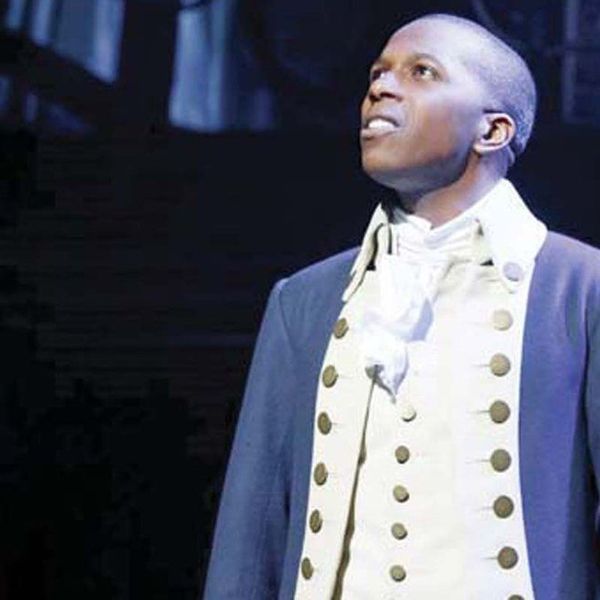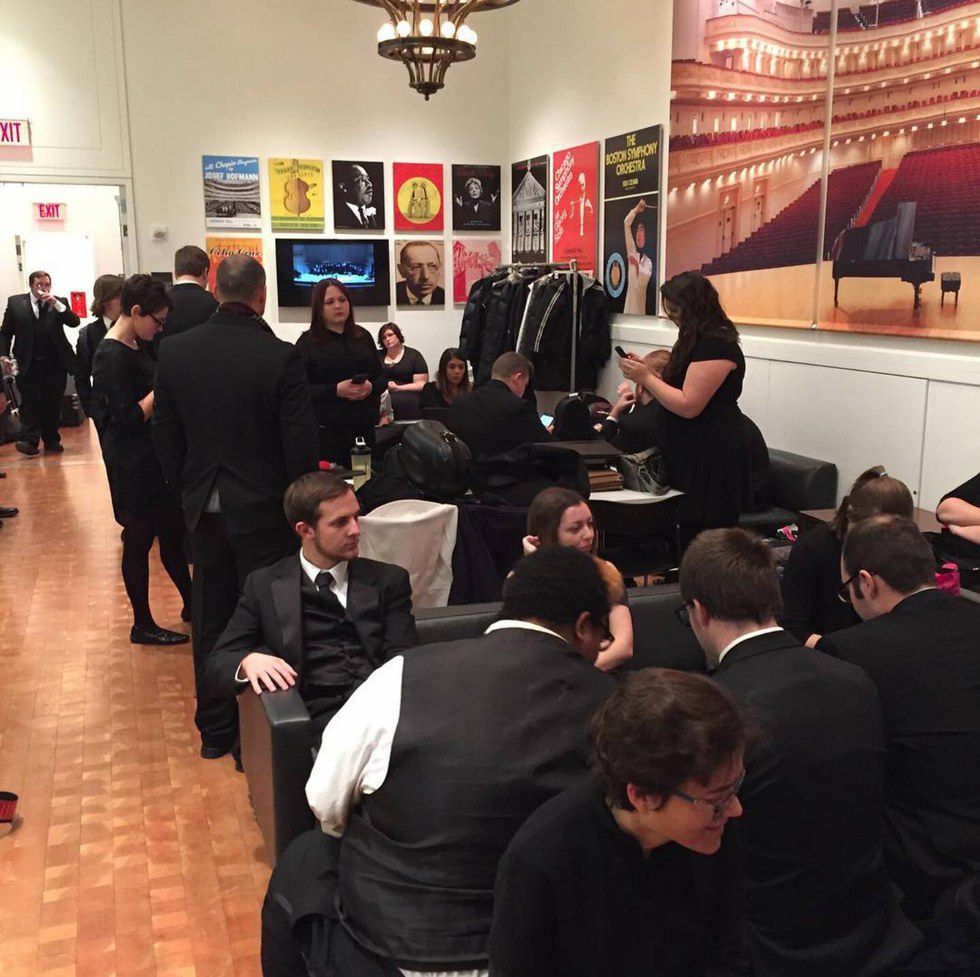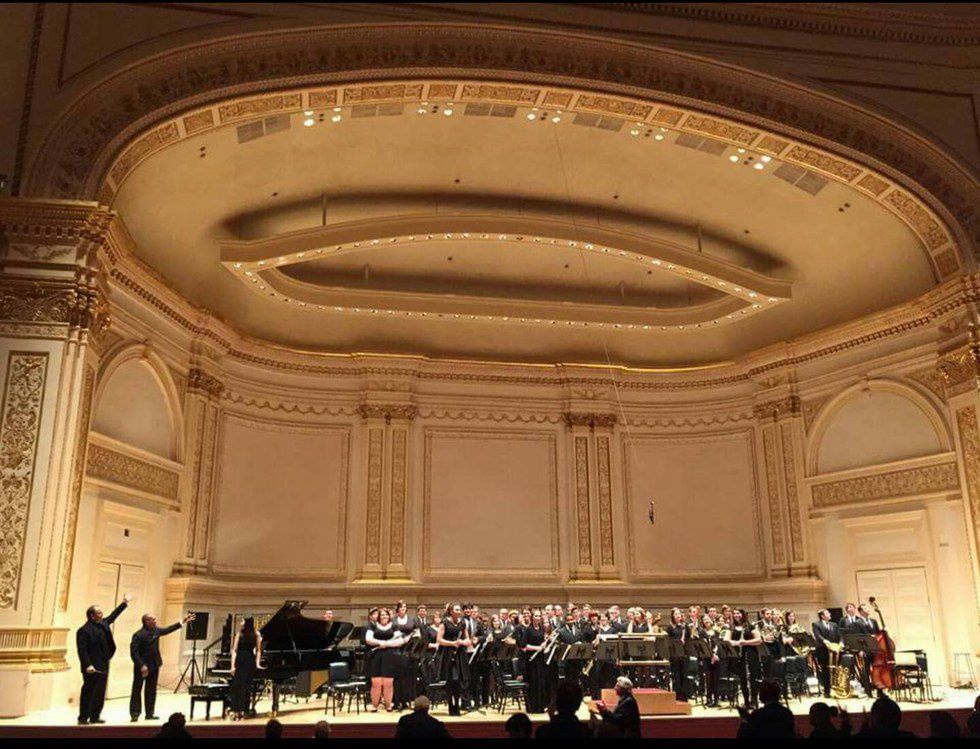At three o'clock on a bitter February morning, I woke up to board a flight from Kansas City to New York. After a long connecting flight, I had arrived in the City That Never Sleeps for the first time. From the airport, I loaded the bus with the other members of the wind ensemble and fought the traffic, while gawking at the infinite skyscrapers towering above our heads. We had arrived at our temporary home for the next four days, the Grand Hyatt New York. The elegant hotel connected to Grand Central Station, giving us easy access to food, shopping and the subway station. The next three days were dedicated to exploring the city-- going on top of the Empire State Building, shopping on Times Square, catching Broadway performances and rehearsing daily in the ballroom of the Grand Hyatt.
I was a small flute player, only 19 years old, joining together in an ensemble to create something much greater than myself. Six months prior to that trip, I wouldn’t have even dreamed of performing in Carnegie Hall. However, I worked hard to make the wind ensemble at UCM and, in just a few short months, found myself embarking on this amazing journey.
When Saturday night had arrived, we waited in the backstage room, anticipating our performance. First on stage was a high school band from a small town in Pennsylvania, followed by the UCM Concert Choir, and concluded with myself and the other members of the UCM Wind Ensemble. For over an hour, we bonded with people we hardly knew existed prior to that trip, waiting for our portion of the concert. Suddenly, an old man stood before us as we pondered what he was doing there. He said to us in a crooked voice, “This is a once in a lifetime opportunity and I hope you cherish these memories. Tchaikovsky was the first person to ever take this stage in 1891. He hated New York so much that he left after the opening festivities of Carnegie Hall. The podium your director will be using is the original podium that Tchaikovsky and every other conductor to ever take that stage have stood on.” The old man ended with a good luck and quietly wobbled away.
When our turn came to perform, we walked on stage in no specific order. It wasn’t until I sat in my chair that everything sunk in and became real. “This is going to be the greatest performance of my life,” I thought to myself. As I waited for the ensemble to finish setting up, I couldn’t help but admire the beauty of the hall -- red velvet seating, golden balconies and chandelier lighting. The theater seemed smaller in person than I expected, with seating higher up, rather than further back. The crowd was large that night with hundreds, maybe even a thousand people in attendance.
Our lead clarinet player walked on stage and bowed before providing us with our tuning notes. As usual, the woodwinds tuned to a concert A pitch and brass to B flat. The perfectly balanced pitches resonated throughout the hall. Nerves were growing tighter. Then came my band director, Dr. Lubaroff, followed by a round of applause. Without a word, he lifted his arms to signal the beginning of our first piece, “Skronk” by John Frantzen, who had flown to New York City to watch our performance. We played the first two notes, which followed by rest. In those two counts of silence, the hall flourished with the most beautiful echo I had ever heard. I could feel the sensation radiating throughout bones, throughout my soul. It was a feeling greater than anything I could have accomplished on my own -- the reverb of our hard work in the world's most famous hall. After we had succeeded in performing the piece, the composer came on stage to be acknowledged for his work.
Next on the repertoire was “Bell Piece” by Percy Grainger, which was soothing as it featured a vocalist and an alto saxophone soloist, both of which reverberated beautifully in the hall. In opposition, our next piece was “Chicago 2012” by Mason Bates. This modern work combined the ensemble with electronics, creating an intimidating effect. Finally, our performance concluded with “Give Us This Day” by David Maslanka. After playing through the piece exceptionally well, we had reached the last chord. It was a full and tense chord, held for what seemed like an eternity, and released together perfectly to create a resonating tone, giving butterflies to each member in the audience.
As the final note was released, the crowd broke out into applause. We stood up to be acknowledged and received a standing ovation that must have lasted five minutes. All of the members of the ensemble were thrilled and smiling. We had taken on New York City and we dominated Carnegie Hall. While I was walking off stage, I received a sweaty hug from my band director. I thanked him for this wonderful opportunity, but no words could express my appreciation. That night, I realized that the significance of Carnegie Hall was not only the vibrant acoustics, but the legacies who had taken the stage before us.
It was a dream to have performed in Carnegie Hall and I continue to fantasize about the day I will return. All the countless hours spent in a practice room were worth it. All the frustrating mistakes and sleepless nights had finally paid off. There is no better feeling than the resonance of your hard work in the world's most famous concert hall.

























